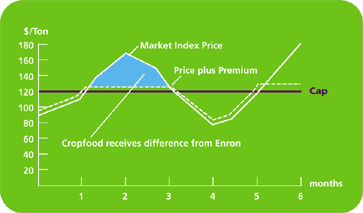 |
CropFood, a manufacturer of urea, wants to develop business with a
prospect that has difficulty passing on price increases, but is expected to
pass on decreases without delay.
To distinguish itself from competitors, CropFood ensures the prospect that
for the next 12 months, CropFood will never ask for a price increase above
its very competitive product prices, no matter how high ammonia feedstock
prices go. And to sweeten the deal, CropFood agrees to promptly pass on
all feedstock price decreases as soon as they are announced, no questions
asked.
The prospect likes CropFood's straightforward pricing policy and agrees to
purchase 1,000 tons of urea per month. In order to honor its pricing
promise without putting the company's margins at risk to rising prices,
CropFood purchases a one-year price cap on ammonia at $120/ton for
12,000 tons per month. The cost of the cap is $2/ton.

During the life of the Cap Agreement
- CropFood continues to buy ammonia from its regular suppliers at
market prices.
- Enron receives a $2/ton premium from CropFood for the $120/ton price
cap.
- If the market price for ammonia goes above $120/ton in a given month,
Enron will pay the difference to CropFood. If prices are less than
$120/ton, CropFood enjoys the lower market prices for its feedstock.
- The effective cost of ammonia paid by CropFood is the floating market
price up to a maximum of $120/ton plus the $2/ton premium paid for
the cap.
- CropFood has, for a known cost of $2/ton captured new business by
meeting the customer's price needs without putting the company at risk
to ammonia prices in the process.
back to Caps and Floors
 |





